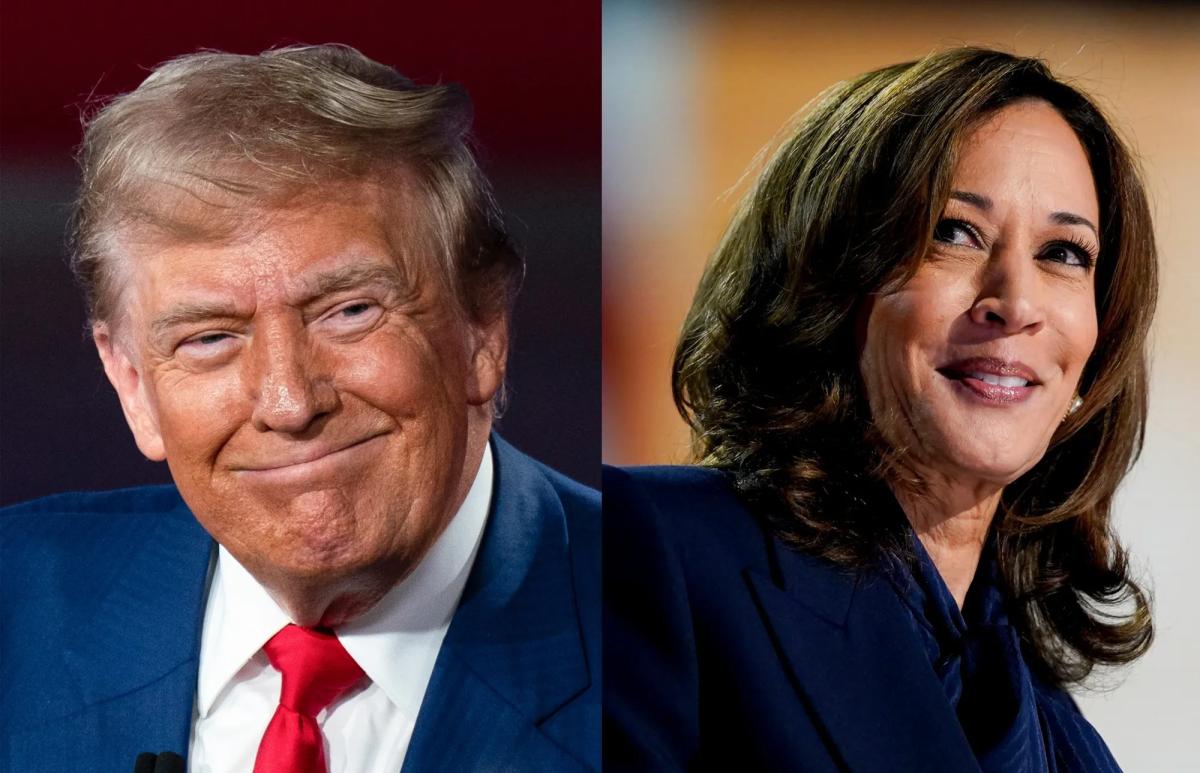Former President Donald J. Trump: Republican Nominee for President
Birth date: June 14, 1946 (age 78)
Birthplace: Queens, New York City, New York
Party: Republican
Spouse: Melania Trump
Education: University of Pennsylvania (B.S.)
Former offices: 45th President of the United States (2017–2021)
Campaign Platform
Former President Donald J. Trump announced his bid for the 2024 presidential race on November 15, 2022. After facing a few primary challengers from the GOP, including Florida Governor Ron Desantis and former UN Ambassador and South Carolina Governor Nikki Haley, Trump earned enough delegate votes to be nominated as the official GOP candidate for president on July 15, 2024, at the Republican National Convention in Milwaukee, Wisconsin. At the convention, Trump was painted as a savvy and successful businessman, who deeply loves his country and has time and again worked to improve it, ultimately charting his path to win the White House in 2017 with the aim to “Make America Great Again.”
Echoing much of the spirit that won him popularity in the 2016 race, Trump’s campaign capitalizes on the notion that “they’re not after me, they’re after you… I’m just standing in the way.” This idea is meant to appeal to the “forgotten middle” of America—the formerly quiet conservatives who proudly stand on values of faith, family, and limited government.
Back again in an attempt to reclaim the White House, President Trump is using his campaign to compare his record to that of President Joe Biden and Vice President Kamala Harris. Top areas of focus include inflation and the economy, the crisis at the southern border, a declining energy independence, a weakened military and more. His official platform has been named Agenda47.
Trump selected Senator J.D. Vance as his running mate. Learn more about Senator Vance's background here.
Policy Positions
Former President Trump’s policy positions largely mirror much of what he championed during his first term in office. Centered around what the Republican Party calls “America First,” his policy proposals prioritize nationalistic ideals of restoring America to the greatest world superpower, “[uniting] our country by bringing it to new and record levels of success,” as his platform states.
1. the Economy
Perhaps core to his 2024 campaign, Trump spends significant time pointing out the differences in economic prosperity between his time in office and the incumbent administration’s leadership from 2021 to present.
On the economy, Trump promises to end record inflation and champion policies that would make everyday goods affordable for working Americans once again. He would push to keep the US dollar as the world’s reserve currency.
Trump and the Republican platform state they will achieve this by spurring production of domestic energy sources, pulling back on wasteful government spending, cutting burdensome regulations, stopping illegal immigration, and working to bring geopolitical stability to rein in the fluctuation of prices on commodities.
Key Takeaway: A Trump administration will place a strong focus on cutting energy mandates of the Biden administration to spur energy production and crack down on “woke” ESG-committed businesses to refocus the American economy on increasing domestic manufacturing and innovation. Expect also that businesses will face greater scrutiny in their hiring practices to ensure undocumented immigrants are not hired and given benefits in place of legal citizens.
2. Tax policy
Trump has vowed to ensure his 2018 Tax Cuts and Jobs Act (TCJA)—which overhauled the tax code, instituted a flat corporate tax rate, and advanced many benefits for individuals and families—remains in place.
Another talking point during previous speeches includes removing tax on tips, helping low- and middle-class workers in service industries simplify their tax filings and keep the most out of their additional income earned through discretionary tips.
Key Takeaway: The reduced corporate tax rate of 21% would be renewed under a Trump administration rather than expiring in 2025.
3. TRADE
Trump’s “America First” trade policies would prioritize domestic production and spending above foreign outsourcing, securing our supply chain through increased manufacturing, farming, and energy independence. Trump has proposed imposing a 10-20% tariff on all imports and a blanket tariff of 60% on imports from China.
These policies will also come from “Buy American, Hire American” policies that would penalize businesses for outsourcing jobs by banning their ability to do business with the Federal Government.
Key Takeaway: With a renewed interest in domestic production, hiring, and supply chain security, Trump will likely enforce tariffs and trade deals with foreign entities that prioritize the prosperity of American-owned and American-made businesses and products.
4. spending
Trump has vowed to rein in “wasteful government spending” by cutting federal funding for sanctuary jurisdictions that release dangerous illegal alien criminals rather than handing them over to US Immigration and Customs Enforcement (ICE).
He also vowed to cut federal spending on any institutions promoting “woke” agendas, such as schools pushing critical race theory, gender affirming healthcare and counseling, or programs/organizations allowing biological men to participate in women’s sports.
Key Takeaway: Public organizations will receive the greatest scrutiny in this area, having to defend any programs the political right has previously targeted such as ESG, DEI, and more.
5. REGULATIONS
Trump’s campaign promises to deregulate where jobs, freedoms, and innovation are being stifled. This would include exploring ways to cut unnecessary regulations that raise housing costs, cancelling Biden-era mandates on the auto industry, and reversing Biden’s Title IX expansion.
Key Takeaway: One of the hallmarks of the first Trump Administration was his promise to cut two regulations for every regulation created. This signature act generally meant an easier operating landscape for business who wanted to skirt environmental standards, labor and employment rules, and in some cases financial guardrails. We expect to see a similar effort in 2025 if the former president wins.
6. HEALTH CARE
Trump has vowed in his campaign to make sure not a penny would be cut from Medicare or Social Security during his second term in office.
The Republican platform states that a Trump administration would work to increase transparency, choice, and competition to lower prescription drug costs and expand access to affordable care. Trump would also work to expand choices for veterans’ care.
Key Takeaway: Americans should expect to see efforts by the Trump administration to lower prescription drug costs for seniors. In areas where Congress has control, however, it’s unlikely to see cuts in Social Security due to the issue being a third rail in American politics. Expect former President Trump to continue rallying against the Affordable Care Act, despite his failure to “repeal and replace.”
7. IMMIGRATION
Trump has capitalized on great support for his positions on immigration reform. Policy proposals include finishing the construction of the southern border wall that he initiated in his first term, as well as stopping illegal immigration via various other means by checking for existing loopholes that allow migrants to circumvent the proper legal process.
Trump has tied the immigration issue to the issue of inflation and a burdened economy, arguing that migrants have put undue strain on American systems such as healthcare, housing, education, and jobs, as well as blaming the “invasion” for increased crime, drugs, and human trafficking.
Trump has proposed reassigning military troops and federal law enforcement agents to our southern border to enforce his border policies.
Key Takeaway: Among Trump’s policy proposals, businesses would face increased attention from the federal government on their hiring practices, as the administration would work to ensure Americans are given priority over migrants when filling open positions. Furthermore, any illegal immigrants currently working will likely be the target of Trump’s mass deportation efforts.
8. climate / sustainability
“Drill, baby, drill” has become the chant of the Republican Party and it’s one that the next Trump administration would push with a vengeance as part of the solution to soaring energy prices.
Trump aims to make America energy independent and a dominant producer of energy in the world.
Proposals around energy production include cancelling Biden’s electric vehicle (EV) mandate on the auto industry, terminating the Green New Deal, and removing burdensome regulations that stall innovation and energy production.
Key Takeaway: Trump and the Republican platform do not mention any sustainability/climate protection policies, indicating it falls below their priority of spurring American energy production. ESG is likely to face intense scrutiny from the Trump administration and energy companies will be prodded to increase production at a record pace to meet the former president’s goals.
9. FOREIGN POLICY & DEFENSE
Trump’s second term will work to quickly resolve geopolitical turmoil oversees by strengthening and modernizing our military and working to restore peace in Europe and the Middle East.
“Tough on China” policies would be implemented in a second Trump term by revoking permanent normal trade relations (PNTR) with China, imposing a 60% blanket tariff on Chinese imports, phasing out imports of essential goods, deepening tech restrictions, and prohibiting China from buying land and industries on American soil.
The Trump administration would demonstrate strong pro-Israel policies and forge alliances with independent nations to promote peace, stability, and prosperity overseas.
Key Takeaway: “Tough on China” policies often impact trade, but investment in US defense industries can prove promising for a boosted outlook in that sector.
10. CRIME & OTHER DOMESTIC POLICIES
All in all, Trump and the Republican National Committee (RNC) have vowed to defend constitutional rights and freedoms, including freedom of speech, religion, and the Second Amendment—all policies that forge strong support from the political right.
To deter crime, immigration policies and law and order policies will rise to the forefront, as enforcement ramps up in cities and border states where illegal activity has increased.
Trump has promoted a deportation of pro-Hamas “radicals,” particularly from college campuses, to restore patriotism and fight antisemitism.
Election integrity, a controversial talking point of the Trump campaign since his loss in 2020, would be a core priority of his administration. Trump would work to promote same-day voting, strengthen voter identification processes, and protect elections from foreign interference by using paper ballots.
Additionally, Trump has taken on the fight against Biden’s Title IX expansions, defending women’s sports by condemning policies that allow transgender men to compete in their categories. His administration would reverse Title IX to prior interpretations on this basis, something that would face great backlash from the LGBTQ+ community.
Key Takeaway: On crime and other domestic policies, the Republican Party has made clear it will stand in the way of what it deems “woke” initiatives and policies. A Trump administration may work via Executive Order to course correct much of what President Biden accomplished during his first term in office as well as empower a Republican Congress (should they maintain control of the House/regain control of the Senate) to legislate accordingly.
Biography
Donald John Trump was born in Queens, New York, on June 14, 1946. His father, Fred Trump, was a successful real estate developer. Trump was educated at the New York Military Academy and the Wharton School of Finance and Commerce at the University of Pennsylvania.
In 1971, he took over his father’s real estate company, renaming it the Trump Organization. The business soon became involved in a variety of projects, including hotels, resorts, residential and commercial buildings, casinos, and golf courses. His first of many books was The Art of the Deal, published in 1987. In 2004, he launched the reality television show The Apprentice.
In 2005, Donald Trump married Melania Knauss. They have one son, Barron. Trump also has four adult children from previous marriages: Donald Jr., Ivanka, Eric, and Tiffany.
During the 2016 primary, Trump defeated more than a dozen rivals to win the Republican nomination. While he lost the popular vote, Trump defeated former Secretary of State Hillary Clinton in the General Election by winning a majority of Electoral College votes. His campaign slogan was “Make America Great Again.”
Without previous elected political experience, then-President Trump used unconventional methods to communicate his priorities. Most notably, he used the social media platform Twitter (now X) as a primary mechanism for direct communication with the American public, other politicians, and the press corps.
As president, he signed a major tax reform bill into law and oversaw a reduction of federal regulations. His protectionist trade policies included tariffs in foreign aluminum, steel, and other products. The Trump administration also renegotiated trade agreements with Mexico, Canada, China, Japan, and South Korea. Other domestic priorities included Supreme Court and federal judiciary appointments, increased military budgets, aggressive border and immigration control, criminal justice reform, and the reduction of prescription drug prices.
In foreign policy, the Trump administration moved the US Embassy in Israel from Tel Aviv to Jerusalem and brokered normalization agreements between Israel and a number of countries. In 2018, President Trump attended a summit with Kim Jong Un, marking the first time a sitting president met with a North Korean leader.
In 2018, there was a partial government shutdown as Trump disagreed with Congress over funding for a border wall between the United States and Mexico. The funding lapse lasted thirty-five days before it was resolved.
In 2019, a federal whistleblower filed a complaint that Trump had pressured Ukrainian President Volodymyr Zelensky to investigate former Vice President Joe Biden’s son Hunter, who had served on the board of Burisma Holdings, a natural gas company in Ukraine. Later that year, the House of Representatives impeached President Trump based upon allegations of obstruction of Congress and abuse of power. In 2020, the Senate acquitted Trump on both articles of impeachment.
The first confirmed case of COVID-19 was reported in the United States on January 20, 2020. The remainder of Trump’s presidency was consumed with the coronavirus pandemic. Critics argued that Trump’s response to the pandemic was delayed and did not sufficiently encourage public health practices to reduce the spread of the virus. However, the Trump administration’s program “Operation Warp Speed” assisted in the private sector development of two approved vaccines. Nonetheless, by the time Trump left office, more than 400,000 Americans had died of COVID-19.
Trump lost reelection to Democratic candidate Joe Biden but publicly claimed widespread voter fraud had affected the outcome. Supporters of President Trump traveled to Washington, DC for a “Save America” rally on January 6, 2021. Trump spoke to a large crowd on the Ellipse near the White House and encouraged attendees to protest the counting of the Electoral College votes in Congress. The rally turned violent when the president’s supporters overwhelmed law enforcement, breaching the United States Capitol and disrupting the vote count. Five people died as a result of the violence and the Capitol complex suffered millions of dollars in damage.
On January 13, 2021, Trump’s actions resulted in the House of Representatives approving another article of impeachment: the incitement of insurrection. He is the only president in American history to be impeached twice by Congress.
For more on global elections in 2024, the EGA Election HQ is your guide to the moments that matter, what comes next, and what all of this means for industries and sectors. Sign up here to receive global election updates from the EGA Election HQ team. For counsel or to get in touch, reach out at: Elections@edelmanEGA.com.
This content offers a high-level synopsis of current events. It is intended to provide information only, not opinion, and is not representative of any specific EGA work.



